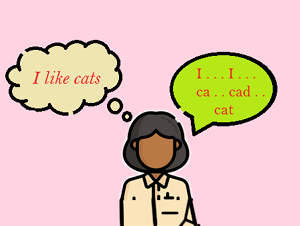/əˈfeɪ.ʒə/ (noun)
Aphasia
Aphasia refers to any damage to the left hemisphere that often provokes aphasia (dysfunction in, or loss of, language due to neurological damage. This damage results in a loss of procedural ability to use the L2 (i.e. learners cannot automatically and accurately access all aspects of their implicit knowledge of the L2 for purposes of communication (Paradis, 2004). As a result, there may be a failure in comprehending L2 messages or in producing spontaneous sentences that are grammatically correct.
Watch this video on Aphasia
Damage to the left hemisphere often provokes aphasia (dysfunction in, or loss of, language due to neurological damage) whereas right-side damage does not (Springer & Deutsch, 1993, p. 1).
In the dichotic listening tasks, subjects – presented with competing stimuli in each ear – are frequently more successful at reporting speech presented to the right ear (a right ear advantage) with assumed privileged left hemisphere projections than non-speech stimuli presented to the left.
Deficits to the right hemisphere may include failure to integrate information across sentences, integrate information in making inferences, follow a storyline in a narrative, or fully understood jokes, sarcasm or prosody.
Damage to the left hemisphere often provokes aphasia. This damage results in a loss of procedural ability to use the L2 (i.e. learners cannot automatically and accurately access all aspects of their implicit knowledge of the L2 for purposes of communication. As a result, there may be a failure in comprehending L2 messages or in producing spontaneous sentences that are grammatically correct.
In the dichotic listening tasks, subjects – presented with competing stimuli in each ear – are frequently more successful at reporting speech presented to the right ear (a right ear advantage) with assumed privileged left hemisphere projections than non-speech stimuli presented to the left.
Deficits to the right hemisphere may include failure to integrate information across sentences, integrate information in making inferences, follow a storyline in a narrative, or fully understood jokes, sarcasm or prosody.
Parts of speech
Adjective: aphasic



